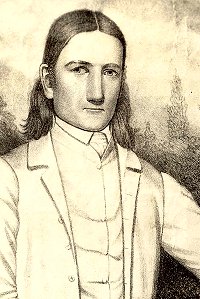I came to the spot where
The white pilgrim lay,
And pensively stood by the tomb;
When in a low whisper
I heard something say:
“How sweetly I sleep here alone.
“The tempest may howl, and
The wild thunders roll,
And gathering storms may arise;
Yet calm are my feelings,
At peace is my soul,
The tears are all wiped from my eyes.
“Go tell all the friends that
To me were so dear,
To weep not for one that is gone.
The hand that once led me
Through scenes dark and drear,
Has sweetly conducted me home.
“The cause of my master
Propelled me from home,
I bade my companion farewell;
I left my sweet children,
Who for me now mourn,
In far distant regions to dwell.
“I wandered an exile
And stranger below,
To publish salvation abroad,
The trump of the Gospel
Endeavored to blow,
Inviting poor sinners to God.
But when among strangers,
And far from my home
No kindred or relative nigh,
I met the contagion
And sunk in the tomb,
My spirit to mansions on high.
HIS WIDOW
I called at the house of
The mourner below,
I entered the mansion of grief;
The tears of deep sorrow
Most freely did flow—
I tried, but could give no relief.
There sat a lone widow,
Dejected and sad,
By troubles and sorrow oppressed;
And here were the children
In mourning arrayed,
And sighs were escaping each breast.
I spoke to the widow
Concerning her grief,
I asked her the cause of her woe;
And why there was nothing
To give her relief,
Or soothe her deep sorrow below.
She looked at her children,
Then looked upon me,
That look I can never forget,
More eloquent far than
A seraph can be,
It spoke of the trials she met.
“The hand of affliction
Falls heavily now;
I’m left with my children to mourn;
The friend of my youth now
Lies silent and low,
In yonder cold graveyard alone!
“But why should I mourn, or
Feel bound to complain,
Or think that my fortune is hard?
I met with affliction—
’Tis truly his gain—
He’s entered the joy of his Lord!
His work is completed,
And finished below;
His last tear is fallen, I trust;
He preached his last sermon
And met his last foe;
Has conquered, and now is at rest!
